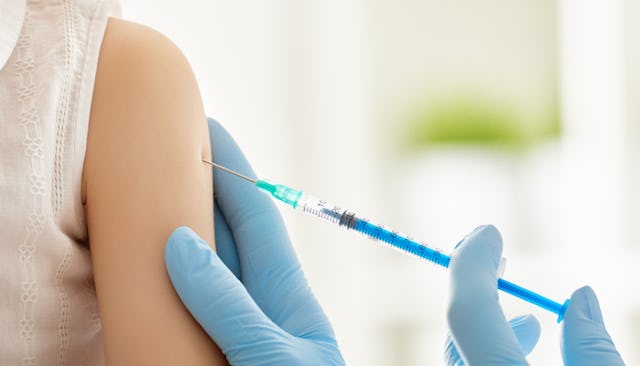New Study Proves What We Already Knew: Anti-Vaxxers Make Everyone Sick

A new study proves anti-vaxxers are contributing to measles and pertussis outbreaks
Whenever there’s a measles or pertussis outbreak, we tend to point the finger where it logically belongs: at anti-vaxxers. It makes sense that people who opt out of vaccines for no medical reason would contribute most to the spread of preventable illnesses, but until now, we haven’t had the numbers to prove it. Finally, a groundbreaking new study has confirmed what we already knew: anti-vaxxers make everyone sick.
For a study published in the Journal of the American Medical Association this week, researchers analyzed data from over 1,400 measles cases and 10,000 pertussis cases, to determine what impact anti-vaxxers have on their resurgences. What they found wasn’t surprising, but the numbers are still pretty disturbing.
Out of 1,416 measles cases reported since 2000, nearly 60 percent of those infected never got a measles vaccine. Even worse, 70 percent of those unvaccinated cited non-medical reasons for declining their shots — in other words, they either used a religious exemption or went to the school of Jenny McCarthy.
The numbers for pertussis were equally dire, with unvaccinated people comprising 24-45 percent of people infected in five major outbreaks between 2010 and 2014. In eight of 12 pertussis outbreaks where vaccination data was collected, 59-93% of patients were unvaccinated by choice.
What you might notice in all of this data is that unvaccinated people aren’t the only ones who get sick. If you’re familiar at all with anti-vaccine rhetoric, then you already know what anti-vaxxers will say about that: if vaccines are so effective, why did vaccinated people get sick? Also, if you’re vaccinated and vaccines work so well, why are you worried about someone else’s kids not being unvaccinated?
The answer to those questions is actually pretty simple. According to the CDC, three percent of people who receive the measles vaccine and two percent of those who receive the pertussis vaccine may still get sick. Immunity to measles and pertussis also tends to diminish over time, which means even people who get their vaccines can still be vulnerable to illness.
What protects them is herd immunity — a general immunity in a population thanks to high vaccine rates. When more people are unvaccinated, more people get exposed to disease. As senior study author Dr. Saad Omer puts it, “If there are a high number of susceptible or unvaccinated individuals in the community, the risk of getting infected – even for vaccinated children – goes up.”
According to the Los Angeles Times, researchers in the study used the data they collected to track the trajectory of past outbreaks. In doing this, they found two important things: that anti-vaxxers tend to be among the first to get sick when an outbreak occurs, and that they act as a “key accelerant” in spreading the illness to vulnerable parties. Basically, if more people were vaccinated, outbreaks wouldn’t grow the way they do now.
It’s difficult to measure the exact risk posed by anti-vaxxers, but this new information is important because it confirms the risk is really there. People who refuse vaccination not only put themselves in harm’s way, but also contribute to the rapid spread of disease and expose vulnerable people who, perhaps, never would’ve gotten sick otherwise.
A mere 15 years ago, measles had been eliminated in the U.S., save for cases brought in from outside the country. In the past two years alone, we’ve seen 856 confirmed cases. It’s not a coincidence that preventable illnesses are coming back in big numbers, and it only bolsters the reality that vaccination is not a personal choice. Vaccination protects us all.
H/T Huffington Post
This article was originally published on